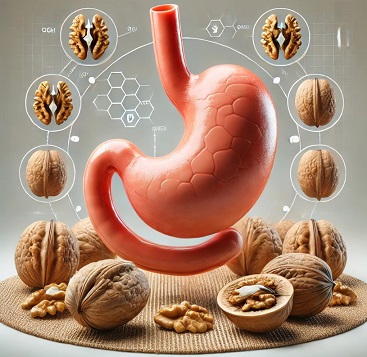Nikhil Prasad Fact checked by:Thailand Medical News Team Jul 01, 2024 1 year, 7 months, 4 days, 11 hours, 53 minutes ago
Gastroenterology Updates: Non-steroidal anti-inflammatory drugs (NSAIDs) like ibuprofen and aspirin are commonly used to relieve pain, reduce inflammation, and lower fever. However, these medications can cause significant damage to the stomach lining, leading to ulcers and other gastrointestinal (GI) issues. This
Gastroenterology Updates news report explores how incorporating walnuts into your diet might offer protection against such damage, based on the findings from a recent study conducted by researchers from South Korea.
 Walnuts: A Tasty Solution to NSAIDs-Induced Stomach Problems
Walnuts: A Tasty Solution to NSAIDs-Induced Stomach Problems
Image - AI Generated
The Problem with NSAIDs
NSAIDs are among the most widely used medications worldwide, prescribed for various conditions ranging from headaches to arthritis. Despite their benefits, these drugs can harm the stomach lining by reducing the production of protective prostaglandins. This reduction leads to increased acid production and decreased mucus and bicarbonate secretion, creating an environment where stomach ulcers can develop.
The Power of Walnuts
A study conducted by researchers Dr Jong Min Park and Dr Ki Baik Hahm from Daejeon University and CHA University in South Korea has uncovered promising results regarding the protective effects of walnuts against NSAID-induced stomach damage. Walnuts are rich in polyphenols, omega-3 fatty acids, and antioxidants, which collectively contribute to their protective properties.
The Study at a Glance
The researchers administered indomethacin, a type of NSAID, to both gastric mucosal cells and live rats to induce stomach damage. They then treated these cells and animals with walnut polyphenol extracts (WPEs) to observe the potential protective effects.
Key Findings
-Reduction of Inflammation
The study found that walnuts helped reduce inflammation in the stomach lining. Indomethacin increased the levels of COX-2, an enzyme associated with inflammation, while decreasing COX-1, which protects the stomach lining. WPEs reversed these effects, reducing COX-2 and increasing COX-1 levels.
-Boosting Antioxidant Defenses
Walnuts also enhanced the antioxidant defenses in the stomach. They increased the expression of HO-1, an enzyme with significant antioxidant properties, through the activation of the Nrf2 pathway. This increase helped mitigate the oxidative stress induced by NSAIDs.
-Promoting Healing
Another crucial finding was the upregulation of 15-PGDH, an enzyme that helps break down harmful prostaglandins. The researchers discovered that walnuts could induce the expression of this enzyme, aiding in the resolution of inflammation and promoting the healing of the stomach lining.
Practical Implications - Adding Walnuts to Your Diet
Incorporating walnuts into your daily diet could be a simple and n
atural way to protect your stomach if you regularly use NSAIDs. The study suggests that a moderate daily intake of walnuts can provide significant protective benefits.
Freshness Matters
It's essential to consume fresh walnuts to maximize their protective effects. The study highlighted that walnut extracts stored for extended periods lost some of their beneficial properties due to oxidation.
The Science Behind the Findings
-Molecular Pathways
The protective effects of walnuts are rooted in complex molecular mechanisms. The study detailed how walnuts activate the Nrf2 pathway, leading to increased expression of HO-1. This enzyme plays a critical role in reducing oxidative stress and inflammation.
-Resolvin E1
Walnuts are also rich in omega-3 fatty acids, which are precursors to resolvin E1 (RvE1). RvE1 is a molecule that helps resolve inflammation, further contributing to the protective effects against NSAID-induced stomach damage.
Looking Ahead - Potential for Human Trials
While the study's findings are promising, further research involving human trials is necessary to confirm the protective effects of walnuts against NSAID-induced stomach damage. Such studies could pave the way for dietary recommendations and interventions.
Exploring Other Natural Remedies
The success of walnuts in this study opens the door to exploring other natural foods and supplements that might offer similar protective benefits. Continued research in this area could lead to safer and more effective strategies for managing pain and inflammation without compromising stomach health.
Conclusion
Incorporating walnuts into your diet might be a delicious and effective way to protect your stomach from the harmful effects of NSAIDs. This natural remedy offers a promising approach to managing pain and inflammation while safeguarding your digestive health. As always, consult with your healthcare provider before making any significant changes to your diet or medication regimen.
By understanding and leveraging the power of natural foods like walnuts, we can take proactive steps toward better health and well-being.
The study findings were published in the peer reviewed International Journal of Molecular Sciences.
https://www.mdpi.com/1422-0067/25/13/7239
For the latest
Gastroenterology Updates, keep on logging to Thailand Medical News.
Read Also:
https://www.thailandmedical.news/news/probiotics-show-promise-for-kids-with-irritable-bowel-syndrome
https://www.thailandmedical.news/news/new-specific-type-of-gastric-cancer-fast-emerging-among-younger-patients
